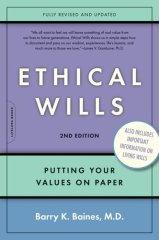Preserving Family Values With an Ethical Will
Biff Barnes
Family historians and memoirists seeking to pass on stories of their life experiences have rediscovered an old tool. The ethical will, is designed to provide a statement of the author’s accumulated values, beliefs and life lessons.
Originally described in the Talmud and the Bible, ethical wills have recently recommended by a diverse group of advocates. We agree with Scott Friedman and Alan Weinstein, writing for the American Bar Association who said, “A parent’s insight, knowledge and wisdom are the most important assets they can transfer to a child.”
Contemporary ethical wills differ in one important way from their traditional counterpart. The historical prototype was meant to be delivered to a person’s family after his death. But now ethical wills are written and presented to family members while the author is still alive.
Contemporary ethical wills, “...can be viewed as writing a love letter to your family,” said Barry Baines, the medical director of a Minneapolis hospice program and author of Ethical Wills: Putting Your Values on paper.

With extended families scattered across the country and even the globe, children don’t have the opportunity to hear the family stories that once were routinely repeated at grandma and grandpa’s dinner table. “Kids don’t grow up near their grandparents anymore,” said Karen Russell, founder of the non-profit National Grief Support Services. “Ethical wills are a way to have continuity when we don’t live with each other.”
There are no rules for writing an ethical will. “Just make sure it comes from the heart,” says Baines. Some of the things which are often part of an ethical will include:
- A statement of personal, religious or cultural values. This statement is often accompanied by examples of times when you did things to act on your values.
- Words of praise for those who deserve it
- An apology (if necessary)
- A request for forgiveness (if necessary)
- An offering of forgiveness (if necessary)
- An honest attempt to settle and resolve unresolved issues and disputes
- Words of wisdom. You might consider including things you have learned from both members of your family and from experience.
- Something(s) you are grateful for
- Your hopes for the future
Be careful to avoid lecturing people. “There’s a temptation to try to criticize, cause guilt, or tell people how to behave,” says Rabbi Jack Reimer co-author of So That Your Values Live On: Ethical Wills and How to Prepare Them.
Recently many people have expanded the idea of ethical wills to include family stories, history and formative or important personal experiences. The goal is to help future generations know the person who wrote the will and the world in which they lived. It is possible to make the elements of an ethical will a part of a Stories To Tell project.
Whatever form your ethical will might take, the financial advisors known as The Motley Fool captured its potential value when they said, “Photos can fade and inheritances are eventually spent. But an ethical will can provide inspiration to generations to come.”